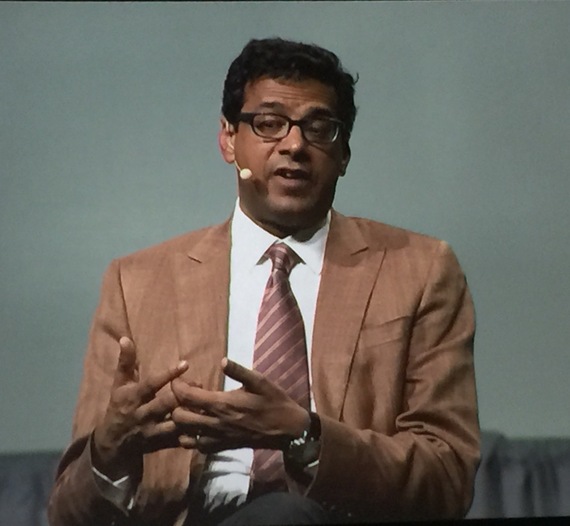It was over 90 years ago that Dr. Francis Peabody at Harvard Medical School illuminated for physicians then and to today what we best need to do. He said, For the secret of the care of the patient is in caring for the patient.

Dr. Atul Gawande
One of today's prominent physicians and writers is Atul Gawande, MD, a Boston surgeon. His articles and books early on spoke to how to improve our troubled health care system. But more recently, no doubt the result of his father's terminal illness, his focus has been on what makes for a good life and a good death. I had the opportunity to hear him speak at the annual meeting of The American Psychiatric Association, where he filled a huge auditorium of psychiatrists. I loved it that a surgeon was telling psychiatrists about how to speak with patients and help ill people find their own way when faced with life ending matters.
Gawande told stories, as a writer would. One was about an older man suffering from Alzheimer's disease and living in a nursing home. The patient was on a puréed diet to protect him from choking on more solid food. But he constantly stole cookies, which the staff found and confiscated. The nursing home was putting his swallowing safety above whatever limited pleasure he might get from a cookie.
More personally and poignantly he spoke about his father, a physician, whose malignant illness called for a surgical procedure to help him survive. But his son and the rest of their family turned to the father and asked him what would make for a good remainder of his life? His answer was to have more time "at the dinner table" with family and friends, which the surgery and its aftermath would have precluded. He died having it his way.
What Dr. Gawande was telling us, doctors, patients and families, in his talk and in Being Mortal: Medicine and What Matters in the End (his latest and best-selling book) was that the long standing priority to help someone live longer is not frankly what many people would choose. And the way to find out is to ask them, to elicit what the patient wants. In fact, way too many doctors talk too much (in the very little time they have with a patient) and don't listen enough.
What we all can ask ourselves -- if ill or as caregivers -- is what matters? Is there something other than living longer that a person wants? We may discover it is the opportunity to enjoy time with loved ones, to not suffer needlessly, to contribute in some way. And to let nature take its course free of intrusive and burdensome medical heroics where there is not good evidence that people live longer and certainly not better.
Dr. Gawande also spoke about clinical research he has been doing with Dr. Susan Block (a Boston doctor specializing in Psychosocial Oncology). They randomly assigned into two groups, as is done in proper research, cancer patients (each paired with a family member or friend) at Dana-Farber Cancer Institute who were considered to have less than a year to live and also experiencing mild to moderate anxiety or depression. One group received early, usual palliative care and the other received a Conversation structured by a 7-item questionnaire -- depicted below (1-4).
Their project is now in its fourth and final year. More than 70 percent of Dana-Farber's oncologists, physician assistants, and nurse practitioners have voluntarily enrolled, an extraordinary engagement rate since they were to be trained and monitored for the duration of the study, not to mention they had to change their approach to patients.
Dr. Gawande summarized some of the preliminary findings, which his research institute reported at a Palliative Care in Oncology Symposium in October, 2015 (2):
- The Serious Illness Care training program is widely adopted and viewed as effective by clinicians (average rating 4.3 out of 5);
- The intervention results in significantly more patients who have a goals-of-care conversation before death (92 percent intervention vs. 70 percent control);
- 86 percent of patients who had the Serious Illness Conversation with their oncology clinician said they found it worthwhile; and
- The intervention significantly lowers patient anxiety and depression for patients with moderate to severe symptoms.
Not only did doctors, nurses and physician assistants widely use the Conversation, patients found it worthwhile and were far more likely to achieve their end of life goals. Those patients with emotional distress (presenting with anxiety and depression) showed significantly greater improvements in their psychological state than those who received usual palliative care. Comfort, comfort my people (Isaiah, 40:1-8), as has been written.
When my mother was in a nursing home (The End of My Mother's Life: There Must Be a Better Way, http://www.huffingtonpost.com/lloyd-i-sederer-md/the-end-of-my-mothers-lif_b_704327.html) my family had to stonewall an effort to have her undergo hip surgery even though she was not in pain and could not bear weight in any case. Aggressive hospital care, surgical and medical, unfortunately has too frequently been equated with caring for the patient. Of course, sometimes it is. But often it is the remnant of a persistent ethos of doing more, doing as much as possible, that has driven our philosophy (and values) of health care for a very long time. A life lived well too often has been eclipsed by the relentless pursuit of days of living. It was Abraham Lincoln who said In the end, it's not the years in your life that count. It's the life in your years. Gawande also said in his lecture, almost in passing, No one asks for CPR.
Some might say that people at the end of their lives may not have the emotional or cognitive wherewithal to know what matters. That too is a throwback to the doctor knows best and to patronizing patients and families. Instead, we can appreciate In a dark time, the eye begins to see (Roethke).
Our country continues to try to find its way to answer what makes for: Good medical care? Effective and accessible care? Affordable care? Quality of life during illness and at the end of our lives? The answers to these questions may be hiding in plain sight, and available by asking the patient. Reflexively concluding that bigger and more exhaustive interventions is not the answer. Listening and caring for patients may not be high tech but it is elegant, kind and high time.
........
Serious Illness Conversation Guide (1, 2, 4)
•What is your understanding now of where you are with your illness?
•How much information about what is likely to be ahead with your illness would you like from me? (Some patients like to know about time, others like to know what to expect, others like to know both.)
•If your health situation worsens, what are your most important goals?
•What are your biggest fears and worries about the future with your health?
•What abilities are so critical to your life that you can't imagine living without them?
•If you become sicker, how much are you willing to go through for the possibility of gaining more time?
•How much does your family know about your priorities and wishes?
References:
1)Bernacki, R, Hutchings, M, Vick, J, Smith, G, Paladino, J, Lipsitz, S, Gawande, AA, Block, SD: Development of the Serious Illness Care Program: a randomised controlled trial of a palliative care communication intervention, British Medical Journal, BMJ Open 2015;5:e009032. doi:10.1136/bmjopen-2015-009032
2)Oncology Times, Butcher, L: Dana-Farber Program Seeks to Improve Conversations with Patients with Serious Illness, December 16, 2015
3)Cooper, Z, Koritsanszky, LA, Cauley, CE, Julia L. Frydman, JL, Bernacki, RE, Mosenthal, AC, Gawande, AA, Block, SD: Recommendations for Best Communication Practices to Facilitate Goal-concordant Care for Seriously Ill Older Patients With Emergency Surgical Conditions, Annals of Surgery, Vol. 263, No. 1, January 2016
4)Ariadne Labs: https:/:/www.ariadnelabs.org/areas-of-work/serious-illness care/resources/
---
The opinions expressed herein are solely my own as a psychiatrist and public health advocate. I receive no support from any pharmaceutical or device company.
My book for families who have a member with a mental illness is The Family Guide to Mental Health Care (Foreword by Glenn Close) -- is now available in paperback.
My new book about Four Secrets to Happiness will be available later this year.
